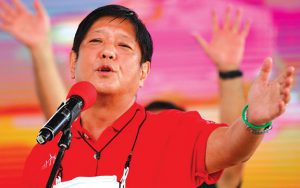Bloomberg
Ferdinand Marcos Jr won a landslide victory in the Philippines presidential election, according to unofficial results, bringing his family back to power in Manila 36 years after his dictator father fled the country.
With 96.7% of the election returns counted, the former senator won 30.7 million votes, or 58.8% of the total votes cast for president. His closest rival, Vice President Leni Robredo, got 14.6 million votes, or 28%. Despite the wide margins, Marcos Jr avoided claiming victory even as his supporters celebrated on Tuesday in front of his campaign headquarters.
“A lot of people are saying the fight is over, but it’s not,†Marcos Jr, known as Bongbong, said in a televised speech. “Let’s wait until the 100% of votes have been counted and the victory is very clear before we celebrate.â€
So far, Marcos Jr got the highest share of the vote since his father won the presidential elections in 1981, which the opposition boycotted at the time.
Robredo also didn’t concede, though she prepared her supporters for defeat in a speech.
“The voice of the people is becoming clearer and clearer,†she said. “In the name of the Philippines that I know you also love, we need to listen to this voice because in the end we only we have one country that we share.â€
While both major candidates pledged to revive the economy and boost employment, Marcos Jr, 64, drew on the support of voters comfortable with the strong-man rule of outgoing President Rodrigo Duterte. His daughter, Davao City Mayor Sara Duterte, joined up as Marcos Jr’s running mate and was leading her closest rival by an even bigger margin.
Marcos Jr.’s victory would bring a measure of continuity to the Southeast Asian nation of 110 million people, along with big questions about how he’ll rule. Although he has pledged to carry on with Duterte’s policies, it’s uncertain how he’ll handle an investigation into his family’s wealth, US-China ties and economic policy.
A Bloomberg survey in March found that Philippine investors were lukewarm toward a Marcos Jr presidency and preferred Robredo, who had a similar economic strategy but emphasized good governance. In the final weeks of the campaign, Robredo drew hundreds of thousands of supporters to hear her speak, suggesting she had some momentum heading into election day.
But polls consistently showed Marcos Jr with a double-digit lead, thanks in part to alliances with most governors and influential local clans around the country. He also built a social-media presence that presented a rosy picture of his father’s dictatorship to the youth, who make up a third of the eligible voters and were not born when the elder Marcos was in power.
“Marcos Jr appears to want to turn back the clock to his father’s era,†said Michael Kugelman, senior associate for South and Southeast Asia at the Washington-based Wilson Center. “It’s unclear how that would ease the country’s immediate economic strain.†Marcos Jr, set to be sworn in on June 30 for a six-year term, faces disqualification cases citing his conviction nearly 30 years ago for failing to file tax returns that could eventually reach the top court after the elections.
 The Gulf Time Newspaper One of the finest business newspapers in the UAE brought to you by our professional writers and editors.
The Gulf Time Newspaper One of the finest business newspapers in the UAE brought to you by our professional writers and editors.
